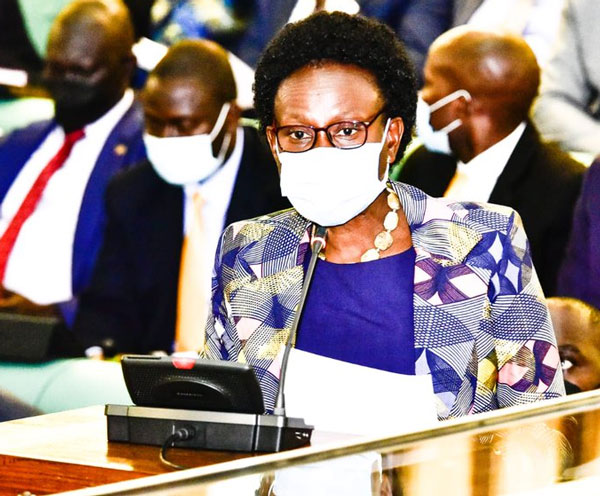
Kampala, Uganda | THE INDEPENDENT | The government has proposed a penalty of life imprisonment for any person who sells or gets involved in any form of compensation for human organs, tissues, or cells. This is part of the Uganda Human Organ Donation and Transplant Bill, 2021 the Minister of Health, Dr. Jane Ruth Aceng tabled before Parliament Tuesday.
The proposed new law prohibits the sale of one organ such as an eye or kidney by a living donor for financial or any other form of compensation. A person who contravenes the provision commits an offense and is liable, on conviction, to imprisonment for life. The life imprisonment sentence will also apply to a person who renders his or her services outside a hospital environment for purpose of removing any human organ without authority.
Dr. Aceng notes that Uganda does not have any law governing human organ donation and transplantation, which is increasingly becoming an area of health care used to cure non-communicable diseases that are rising rapidly. She also states concern about the increase in the illicit trade in and trafficking of human organs, cells, and tissue.
The new bill applies to the donation and transplantation of human organs, tissues, and cells including kidneys, heart, blood, lungs, liver, pancreas, intestines, thymus, bone marrow, bones, tendon, ligaments, corneas, cells, skim, amniotic membrane, penile, uterus, and others.
“The object of this Bill is to establish a legal framework for the regulation of organ, cell, and tissue donation and transplantation in Uganda. The law aims at protecting the dignity and identity of every person and guarantees, without discrimination, respect for his or her integrity and other rights and fundamental freedoms with regard to donation and transplantation of organs, tissues, and cells of human origin,” reads part of the Bill.
Under the Bill, the government seeks to establish the Uganda Organ and Transplant Council to oversee and regulate organ, cell, and tissue donation and transplantation, designate Mulago National Referral Hospital as the pioneering transplant center, and prescribe criteria to be followed when designating a hospital as a transplant center, regulate the conduct of donation and transplant activities and the appropriate consent to be given by donors, among others.
Organ Donation Council and Regulation of Activities
The proposed Council shall oversee and regulate organ, cell, and tissue donation and transplantation and shall work in collaboration with the Uganda Medical and Dental Practitioner’s Council, especially in relation to disciplinary cases against registered medical practitioners certified by the Council.
“The members of the Council shall be persons of high moral character and proven integrity who are qualified in and have had experience and shown capacity in surgery, internal medicine, anesthesiology, bioethics, diagnostics, radiology, health sciences, law, the management or financial management. A member of the Council shall hold office for three years and is eligible for reappointment for one more term,” reads the Bill.
The government also proposes that the Council shall establish and maintain a national waiting list for potential organ donors and recipients drawn from designated transplant centers, hospitals, and health centers and to ensure that organs are allocated to patients on the national waiting list in a fair and equitable manner.
The Bill provides that a hospital designated for donation and transplant activities, shall, for the first five years or such time as determined by the Minister, only use human organs from living donors and those imported.
“A designated transplant center may, after the lapse of the period (five years), apply to the Council for approval to use for therapeutic purposes, human organs, tissues, and cells from cadaveric donors. The Council shall approve local and expatriate transplant surgeons before they can undertake transplantation activities. A transplant surgeon shall not be approved unless he or she is registered by the respective professional councils,” government proposes.
Prohibited Activities and More Penalties under the proposed law
A person commits an offense when he or she gives or receives a reward for the supply of a human organ, seeks to find a person willing to supply for payment, offers to supply any human organ, and others. On conviction, a culprit pays a fine not exceeding 2 billion Shillings (100,000 currency points) or imprisonment not exceeding 20 years or both.
The same penalty of 2 billion Shillings or 12 years imprisonment is proposed for trading and trafficking in human organs. It is the same proposal for a person who renders his or her services to any hospital and for purposes of the removal of any human organ without authority.
Where a person convicted is a registered health practitioner, their name will also be removed from the register of the Council for a period of 10 years for the first offense and permanently for a subsequent offense. It also seeks to prohibit non-authorized health facilities from engaging in organ transplants. “Any hospital, unless designated as a transplant center is also prohibited to conduct, associate with or assist in the removal, storage, or transplantation of any human organ, tissue, or cell,” reads the bill.
It also prohibits a person from performing a transplantation activity without the prior authorization of the Council. A person who contravenes this provision commits an offense and is liable on conviction to a fine not exceeding fifty thousand currency points (1 billion Shillings) or imprisonment not exceeding 10 years or both.
However, the Council may, by statutory instrument exempt certain transplant processes from the prior authorization of the Council including; tissue, bone marrow, and emergency transplants. The proposed law also requires a person and the designated transplant center that performs a transplant to not later than 24 hours after the transplant procedure; to submit a report to the Council.
The government also proposes that all living organ donors shall be registered and offered life-long follow-up, where required and the donation of organs from living donors shall not take place without the prior authorization of the Council.
“A person who transplants an organ from a living donor without prior authorization of the Council commits an offense and is liable, on conviction to a line not exceeding 1 billion Shillings or imprisonment not exceeding 12 years or both,” reads the proposed law. Furthermore, the Bill prohibits the Council from authorizing the removal of an organ from a dead person where the Council has reason to believe that the person’s death is suspicious and may require police investigations.
“No authority for the removal of any human organ, cell, or tissue from the body of a deceased person shall be given by a person to whom the body has been entrusted solely for the purpose of interment, cremation, or another disposal,” government proposes. A person who contravenes this provision commits an offense and is liable, on conviction, to a fine not exceeding 200 million Shillings ten thousand currency points or imprisonment not exceeding 7 years or both.
Donation from a living child is prohibited under the proposed law. However, the Bill provides for appropriate consent for a donation from a dead child. In this case, appropriate consent means the express consent of the child before he or she died witnessed by at least one close relative or an authorized officer, the consent of a person who had parental responsibility for the child immediately before he or she died, witnessed by two adults of sound mind; or the consent of a person who has a close relationship with the child at the time, witnessed by two adults of sound mind.
Consent by Living Adults
The Bill okays donor consent of an adult in writing witnessed by at least two adults of sound mind, one of who is a close relation and where the adult is between the age of 18 years and 21 years, at least one of the witnesses shall be the person having parental rights over that person.
Transport Records
The proposed law requires a designated transplant center involved in the harvesting or transplantation of human organs to keep records and information and submit them to the Council quarterly. The Council shall, in turn, submit to the Minister a report on the activities of the Council.
Contravention of this provision is an offense and on conviction attracts a fine not exceeding 400 million Shillings (20,000 currency points) or imprisonment not exceeding 4 years or both. Dr. Aceng defends the proposed law, saying that the absence of any law regulating organ and tissue donation and transplantation, has made many Ugandan citizens seek medical care from countries like India, the United Kingdom, and Kenya among others in cases where organ donation and transplantation are the solutions to their health problems.
“It is therefore imperative to enact an enabling law to address the existing challenges taking into account that healthcare is continuously evolving. This will protect Ugandans from being potential victims of organ, cell, and tissue trafficking,” said Aceng.
Speaker of Parliament, Anita Among referred the proposed Bill to Parliament’s Health Committee for consideration.
*****
URN
 The Independent Uganda: You get the Truth we Pay the Price
The Independent Uganda: You get the Truth we Pay the Price




Please clarify
Which dead persons are these?
I thought that while still alive one allows the harvest of his/ her organ at the time of expiry
Without this consent, should you
harvest an organ?
Relatives have shown greed for money and this kind of “relative” should be qualified
There should be evidence that the donor has been adequately screened
(should be explicit)
There should be evidence that the environment for the procedure is safe (should be explicit)
Donor consent
“Consent of the mind”
Where is protection of the vulnerable and in this setting it can be extended to power relations
In the eve to that an organ is harvested through dubious means what happens to the victim?